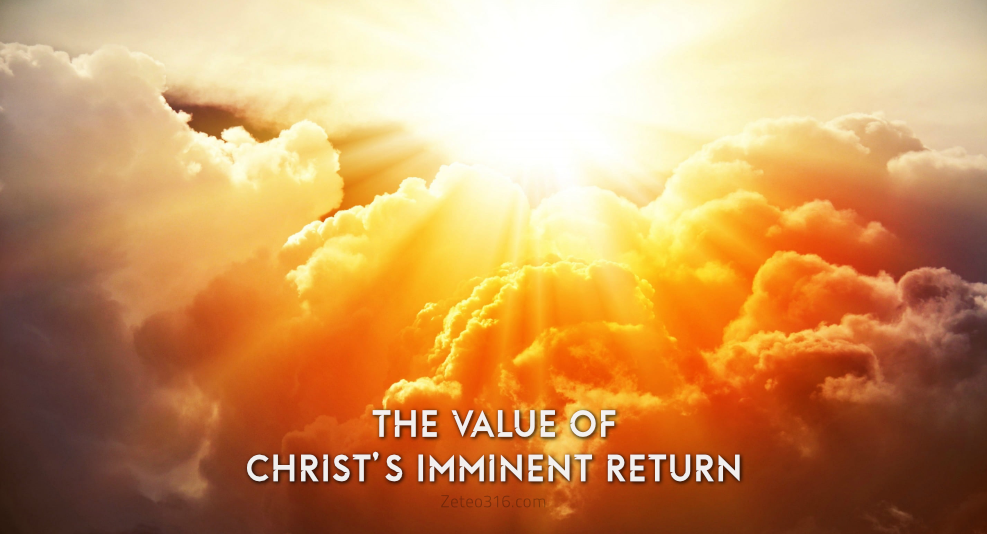
The Value of Christ’s imminent return has been recognized by many good men of the past. Yet others beg to differ, and sometimes quite strongly. One individual went so far as to deny that it is an incentive for holy living. He wrote that,
Imminency resulting in action is just another assumption by the pretribulationalist with no basis in truth. Although their argument sounds really good at first, ultimately it breeds complacency.
In another instance, a writer suggested that imminence ought to be a second-tier doctrine, even within churches which hold to pretribulationism.
One postmillennialist has said that the doctrine of Christ’s imminent return must assume two things: that Christ could come 15 minutes after His ascension (I agree, yet still hold to imminence); and that there are no further prophecies to be fulfilled (quite an irony). Therefore, he concludes, “with sobriety and confidence” that we can say that cannot return imminently, and that there are still centuries of work which Christ must fulfill through His church.
Another sober person responded (and I agree),
…I think this kind of attitude is dangerous. Any argument which teaches believers that Christ’s coming won’t happen for centuries is disastrous!
In all the above cases, the hostility against imminence seems to be driven by those who insist on a particular eschatology. The purpose of this post isn’t to defend the doctrine imminence, but to point out that sober Christians of the past saw value in the concept even of they weren’t pretribulational or necessarily premillennial.
Alfred Edersheim
The ‘when’ – the day and the hour of His [Christ’s] Coming – was to remain hidden from men and Angels. Nay, even the Son Himself – as they viewed Him and as He spake to them – knew it not. It formed no part of His present Messianic Mission, nor subject for His Messianic Teaching. Had it done so, all the teaching that follows concerning the need of constant watchfulness, and the pressing duty of working for Christ in faith, hope, and love – with purity, self-denial, and endurance – would have been lost.
The peculiar attitude of the Church: with loins girt for work, since the time was short, and the Lord might come at any moment; with her hands busy; her mind faithful; her face upturned towards the Sun that was so soon to rise; and her ear straining to catch the first notes of heaven’s song of triumph – all this would have been lost!
What has sustained the Church during the night of sorrow these many centuries; what has nerved her courage for the battle, with steadfastness to bear, with love to work, with patience and joy in disappointments – would all have been lost! The Church would not have been that of the New Testament, had she known the mystery of that day and hour, and not ever waited as for the immediate Coming of her Lord and Bridegroom. (Sourced HERE)
Charles Spurgeon
Oh, Beloved, let us try, every morning, to get up as if that were the morning in which Christ would come! And when we go up to bed at night, may we lie down with this thought, “Perhaps I shall be awakened by the ringing out of the silver trumpets heralding His coming. Before the sun arises, I may be startled from my dreams by the greatest of all cries, ‘The Lord is come! The Lord is come!’”
What a check, what an incentive, what a bridle, what a spur such thoughts as these would be to us! Take this for a guide of your whole life – act as if Jesus would come during the act in which you are engaged – and if you would not wish to be caught in that act by the Coming of the Lord, let it not be your act. (See also HERE)
Robert Murray M’Cheyne
But the truth which I wish to be written on your hearts is this: That the coming will be sudden—sudden to the world—sudden to the children of God: “In such an hour as ye think not, the Son of Man commeth.”… Oh, my friend! your faith is incomplete, if you do not live in the daily faith of a coming Saviour. (Sermons of Robert Murray M’Cheyne, page 71)
F. M. Sadler
[On James 5:7-9] The Lord laid it upon His disciples that they should be ever looking for a coming which might be expected at any moment after His departure, and yet might be long delayed. (Renald Showers, “Maranatha: Our Lord, Come,” page 137)
Maranatha!
